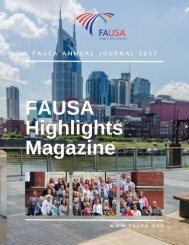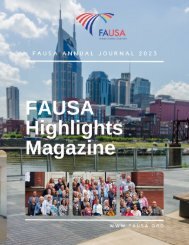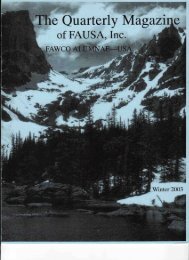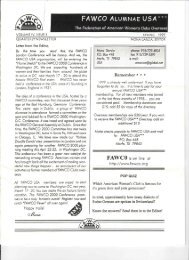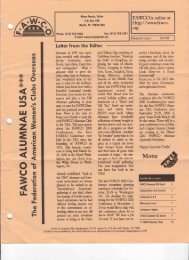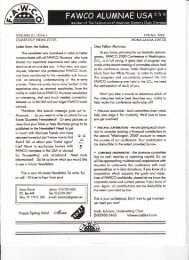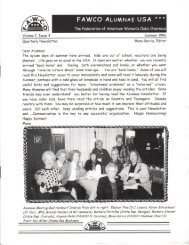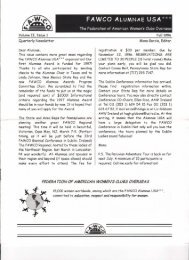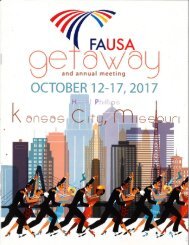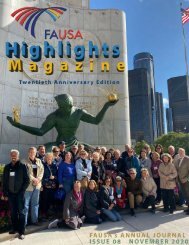FAUSA Highlights Magazine Updated
Create successful ePaper yourself
Turn your PDF publications into a flip-book with our unique Google optimized e-Paper software.
<strong>FAUSA</strong>'S HISTORY<br />
FAWCO Comes Home<br />
Nancy Thornley<br />
The idea of 'returning home' became a<br />
FAWCO reality in the late 1970's when<br />
Helen Cola of Rome, moving back to<br />
Washington D.C., set up a card file of<br />
local repatriates. This group became<br />
known as FAWCO West. A formal<br />
Returning Home Committee was created<br />
in 1980. The Washington group sent back<br />
how-to information on credit, license<br />
plates, mortgages, schools, and whatever<br />
else pertained to adjusting to life back in<br />
the States. Guidelines For Returning to<br />
the USA was published in 1983 in<br />
response to a survey and included a<br />
chapter on returning children. An on-going<br />
ad placed in club bulletins asked:<br />
"Returning to the USA? Don't let us lose<br />
you". A map marked the locations of<br />
FAWCO alumnae - New York, New<br />
Jersey, Connecticut, Boston, Washington<br />
D.C., Maryland, Texas and California.<br />
In 1989 the FAWCO Board appointed<br />
Linda Crowley, in Connecticut, as the<br />
Alumnae Representative. Using a<br />
computer, Linda expanded the<br />
membership file and sent out a newsletter.<br />
She was succeeded by Karen Burdsall. In<br />
1995 Mona Garcia, returning to Texas<br />
from Madrid, set up a more cohesive<br />
alumnae group. Dues were collected and<br />
a quarterly newsletter published; it was<br />
sponsored by a relocation service. It was<br />
Linda who, in 1997 in Dublin, promoted a<br />
first-time-ever FAWCO Conference in the<br />
States, in Washington D.C., to celebrate<br />
America 2000. When this proposal, not<br />
without controversy, was approved, an<br />
alumae committee was appointed and,<br />
with Mona Garcia as chair, set off to<br />
organize the event.<br />
Twenty-one women - Mona Garcia, Linda<br />
Johnson, Linda Sampson, Jude Stalker,<br />
Linda Crowley, Kay Miller, Dorothy<br />
Childers, Elizabeth Bagney, Eileen<br />
Ploumpis, Angela Eliopoulis, Dale<br />
Koepenick, Jean Geese, Dona Belt,<br />
Nancy Thornley, Helen McNulty, Eleanor<br />
Fina, Lisa Chase, Donna Gray, Marilyn<br />
Richey, Shirley Van Ooijen, and Brooke<br />
Givot - met in Chicago on September 17-<br />
20, 1998. The first item of business was<br />
the deposit to the Hotel Washington -<br />
FAWCO had not provided any seed<br />
money. Twenty one personal credit cards,<br />
each charged $500, solved this immediate<br />
problem. The group met again in Santa Fe<br />
in January 1999, and in Washington, D.C.<br />
the following April and October; the<br />
Conference on March 16-20, 2000 was<br />
one of the largest and best attended in<br />
FAWCO history. The Conference<br />
Cookbook, edited by Nancy Thornley, was<br />
created and sold for the occasion.<br />
FAWCO Alumnae USA (<strong>FAUSA</strong>) was<br />
incorporated in the State of Texas on May<br />
1, 2000. Six alumnae - Mona Garcia, Jude<br />
Stalker, Kay Miller, Nancy Thornley, Linda<br />
Sampson and Pat Coker - meeting at Pat's<br />
home in Dunwoody, Georgia, on June 9-<br />
14, 2000, and began the process of<br />
defining <strong>FAUSA</strong>. They met again in<br />
October 12-15 at Linda Sampson's home<br />
in Dallas; Jane Indreland joined the group.<br />
Beginning with it's purpose, the details of<br />
the organization were worked through -<br />
officers, membership, elections, dues,<br />
meetings, etc. Nancy Thornley wrote up<br />
The Constitution, Bylaws and<br />
Administrative Guidelines. "The purpose<br />
of the Association shall be to facilitate the<br />
repatriation experience of its members<br />
and to help them maintain their<br />
international ties in order to bring about a<br />
better understanding between the United<br />
States and other nations." The IRS<br />
designated <strong>FAUSA</strong> as a 501(c)(4) when it<br />
received its tax exemption on December<br />
10, 2001. In 2016 <strong>FAUSA</strong> reapplied to the<br />
IRS for a 501(c)(3) status by making a<br />
bylaw change with a new purpose that<br />
included a charitable dimension: "The<br />
Corporation shall support the repatriation<br />
experience by maintaining an<br />
international network and committing its<br />
resources to the health, education,<br />
environment and human rights of women<br />
and children worldwide." FAWCO had<br />
also changed its philanthropic direction by<br />
targeting programs to the United Nations<br />
goals for women and girls. The new tax<br />
status was granted in April, 2018. The<br />
Bylaws Committee was Karen Sndeker,<br />
Chair; Jane Indreland, Nancy Thornley,<br />
Dale Koepenick and Rick Chizmadia.<br />
The new <strong>FAUSA</strong> group considered itself<br />
quite autonomous, not just an appendage<br />
of FAWCO. It has it's own name, it's own<br />
constitution, its own bank account, its own<br />
Board of Directors. It even had its own<br />
charities; as FAWCO was supportung<br />
projects in Africa, <strong>FAUSA</strong> sought out<br />
those in need south of the border.<br />
For FAWCO, what had been an<br />
alumnae committee was now designated<br />
as an affiliate Club category had been set<br />
up as a two-year trial membership for<br />
American clubs overseas. in 2003<br />
FAWCO amended its bylaws. <strong>FAUSA</strong><br />
became its own entity, an equal partner of<br />
FAWCO and The FAWCO Foundation.<br />
12




